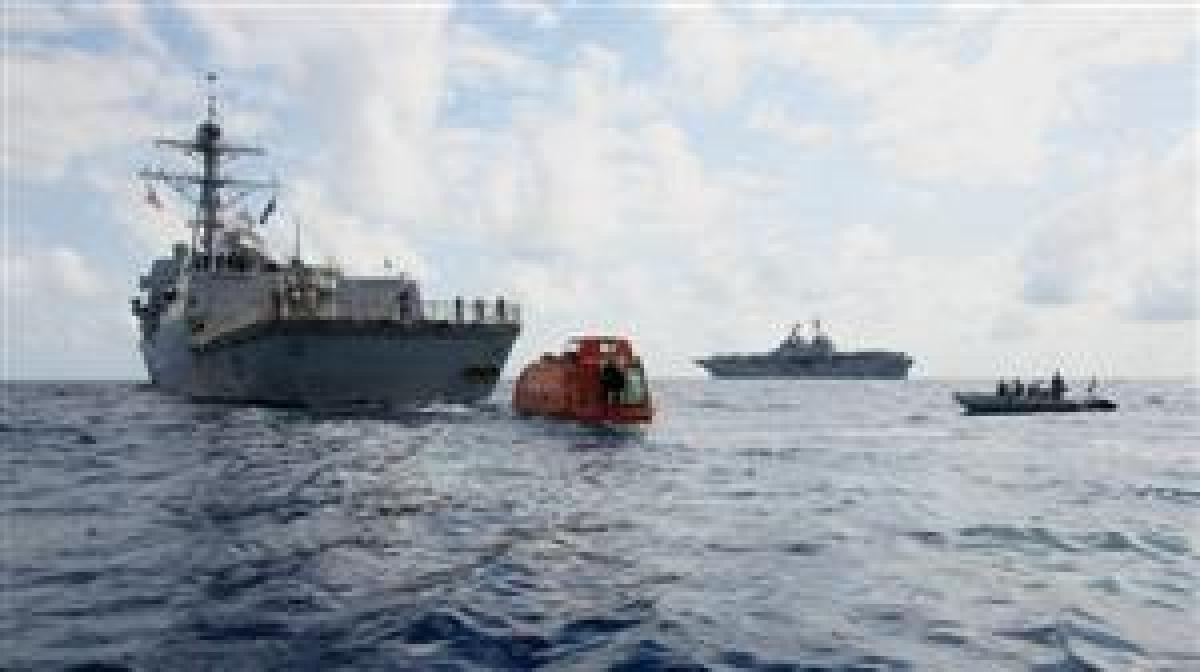To rescue Captain Richard Phillips of the merchant vessel Maersk Alabama in April 2009, the rescue force needed to maintain communication with the pirates, secure their cooperation, reduce their level of vigilance, and take the ship's lifeboat in tow. It may be that these four objectives were achieved through judicious application of "Pop Tart" psychological operations.
In view of its likeness to honey-glazed Middle-Eastern pastries, the Kellogg "pocket pie" would have been more appealing to many Somalis than a Meals Ready to Eat package. Regional experts point out that in Arabic cultures, feeding others is a sign of good breeding, and that food and glory are strongly linked. Fasting in that part of the world is all about sacrifice and humility. Perhaps the warship's crew thought pocket pies could influence pirate conduct. Fed men with glory in their eyes are inclined to be more cooperative than men who are humiliated and hungry.
One of the most successful safe-conduct leaflets of Operation Desert Storm portrayed surrendering Iraqi soldiers enjoying safety, protection, and lots of food. It included the image of a basket of fruit. Surrendering Iraqi soldiers asked, "Where do I get my banana?" Bananas were an Iraqi delicacy and in low supply that year. The U.S. armed forces had dropped other safe-conduct leaflets to the Iraqi ground forces, but none was as effective as the "banana safe conduct."
Every on-scene commander needs to have "How to Influence Opponents' Thinking" included on his operational checklist. It is a true test of humility when naval leadership finds itself tactically indebted to a breakfast of uncertain nutritional benefit.
Once the tow was set, the USS Bainbridge (DDG-96) and the lifeboat were synchronized in their relative roll and yaw, and the lifeboat's relative pitch could be nullified by adjusting the towline that bisected the Bainbridge's wake. Movement on board the lifeboat could be better monitored, and if Captain Phillips should jump overboard again, he and the Somali pirates would be on opposite-and rapidly opening-courses.
Ultimately, the Navy's success lay in its long heritage of cross-cultural contacts. Observing differences was a Navy Gulliver's Travels-type perquisite. Why travel to distant places if the people were going to be just like you? Liberty in strange places was better. Keen skills of social observation have been a traditional side benefit of the naval experience. During the period of Captain Phillips's rescue in international waters off Somalia, all naval skills were in play.
Navy personnel are, understandably, attracted to tactics and technology that produce predictable and quantifiable results. But that emphasis should never displace consideration of the human element. Something caused the Somali pirates to drop their guard and accept a courtesy tow.
Was it Pop Tarts? A non-threatening word or gesture? A well-worded entreaty from a skillful translator? Did it happen as a result of stage-managing the warship's crew? It may have been all the above or something else equally insignificant, from a hard-technology point-of-view. The rescue force used something that influenced the Somali pirates to accept a tow. That tow radically reduced the variables of the rescue operation.
We need to resist the inclination to discard tactics that are not grounded in cutting-edge technology. Other forms of warfare need to be used. In certain units, the Navy has honed in on the strategic signals-intelligence applications of psychological warfare. But fleetwide, greater attention needs to be paid to day-to-day human intelligence applications.
No other service regularly moves its members into so many foreign population centers. The Navy is the armed forces' premiere cross-cultural itinerant. We need to cultivate a broader appreciation of psychological warfare at the tactical level.
The Navy draws insight into the human element from our formal contacts with foreign ministries, militaries, and customs houses; and from our informal contacts with marketplaces, nightspots, back alleys, and bumboats. Something as seemingly insignificant as a Pop Tart held out at exactly the right moment can bring success. But knowing when that moment has arrived or what to hold out involves sharp observation as well as cultural knowledge. This is the human-intelligence element-it is when the insignificant becomes significant.



